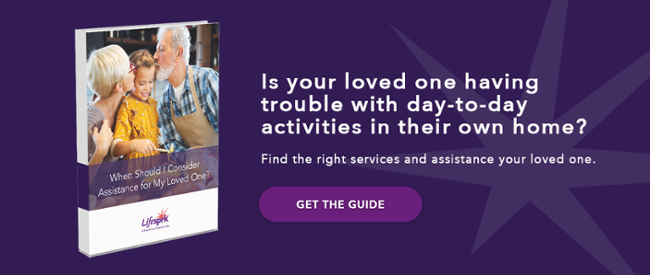
It can be difficult to determine the exact level of care that your loved one may need. While there are plenty of options to choose from, it may seem confusing and overwhelming to find the right care for your loved one. People can be hesitant to give up their independence, which can make it easy for emotions to get in the way adding complexity to the situation.
“Often families are surprised to learn that the smaller health concerns had been lingering for a while before a larger health crisis hit,” said Tanya Castillo, RN Case Manager for Lifesprk. “Seniors want autonomy. They often don’t share these details for fear of losing their independence, convincing themselves they have it under control until they don’t. It’s hard for adult children who worry that their parents are safe and able to age in place to know what to look for. Addressing those little concerns can go a long way to preserving independence and keeping wellness strong.”
Having a set of guidelines to help you determine what is best for your loved one can be helpful in these sensitive situations. By leveraging these guidelines, you can start to decide what level of care your parents need to remain healthy and happy.
Make sure your loved one feels heard
Aging can be challenging for some who struggle with maintaining independence. While it’s common for seniors to feel down about this decline in their autonomy, it’s important to understand their thoughts and feelings. When should you consider assistance can be different for many people, it starts with knowing and understanding your loved one and keeping the conversations going.
When discussing care for your loved one, make sure they feel heard. No one wants to feel that their life is totally out of their control, particularly when independence is such a sensitive subject for many seniors.
Try to have frequent conversations with your loved one about their current situation and opportunities to problem solve together about ways to maintain independence to keep everyone happy. If you notice that they’re closing up or refusing to have these conversations with you, be patient and don’t rush into making any serious decisions without their consent or approval. Sometimes just because it’s what you want, doesn’t mean it’s always the right solution for them, the key is to listen.
It might take multiple attempts of talking with them before they’re receptive to hearing your ideas while they begin to open up to the idea. It’s important they’re well cared for and are safe. If there is no imminent danger, it’s always advisable to take things slow and keep your loved one engaged in the conversation.
Keep their home safe
If your loved one is still living at their home, make sure the environment is safe and free from hazards that might result in emergency situations. Prevent falls by keeping their home free from tripping hazards like clutter, cables, and bulky furniture.
Make sure the house is well lit, giving special attention to staircases so that your parents can clearly see where the stairs are. Ensure light switches are easily reachable and at the entrance of all rooms.
Install grab bars in the bathroom and ensure that baths and showers are fitted with non-slip surfaces to reduce the risk of slipping.
You could also install bars and handles at the sides of beds and chairs, to make it easier for your parents to get up.
Minimizing the risk of falls around your loved one’s home is an important step in caring for their wellbeing. Keeping their home safe will keep them independent longer and give you peace of mind that they’re safe.
Stay in touch
A great way to reassure your parents and keep them safe is to establish a strong communication system. If your parents can easily call you for help when they need it, they’ll feel much safer and find it easier to remain independent.
Make sure they have a reliable phone and wifi to make communication simpler and efficient for everyone. Think about putting a few key numbers on your parents’ speed dial so that they can call relatives and caregivers quickly in an emergency.
Having solid lines of communication will also ensure that your parents remain well- connected to family and friends. Keeping in touch will help ward off loneliness, which is a common problem for many seniors, and can quickly lower their mood and morale.
Consider your own life and abilities
It’s easy to think that caring for your loved one alone is possible and a good idea given the situation. Evaluate the responsibilities and commitments you currently have and see how caring for your loved one fits in so you can plan ahead.
Don’t be too quick to assume that your loved one’s care routine can easily fit into your current day-to-day. You need to be able to care for them effectively while also maintaining your own life.
Caring for loved ones involve a degree of personal sacrifice, so always think carefully about whether you have the time and energy to care for them without compromising their safety or well-being.
Do you already have children or other family members that require time and care? Are you physically able to care for your loved one effectively? Do you live close by? These are all questions you should consider.
It’s ok to decide that you’re not the best person to take on the massive emotional and physical responsibility that caring for your loved one entails.
Find outside help –Download our guide
Caring for aging loved ones is a wonderful and loving responsibility but it also presents challenges you may may not be ready to undertake. Even if you follow each of these tips, it’s easy to feel overwhelmed and unsure of the responsibility. There are plenty of different options to suit each unique situation.
In-home care help
If your loved one is still independent enough to live at home but needs some assistance with household chores and general tasks, it’s a good idea to investigate in-home care. An in-home care assistant can check-in with your loved one several times a week to make sure that they’re ok and able to complete basic tasks.
Depending on the level of care that your loved one might need, you along with the home health aide can determine how frequently they need help and identify the types of tasks they might need to do. If your loved one suffers from some level of memory loss and finds themselves frequently forgetting things, in-home caregivers can remind them to take medications or help them remember to attend important doctor appointments.
Living Communities
If you think that your loved one’s safety is being compromised by them remaining at home, it’s time to look into more comprehensive care options. If your parents need 24/7 care, assisted living in a community might be the best option. It’s hard to care for your loved one on your own, and it’s often safer for them to be surrounded by professionals on a full-time basis in an environment that enhances social connections so they can live fully, yet safely.
How a Lifesprk Life Care Manager can help you
Life Care Managers can offer a great solution to your loved one’s care. Available from the start to properly get to know you and your loved one’s health and wellbeing, they understand that every person has different needs. They work alongside you to create a unique plan to help your loved one prioritize what’s most important in the care that your loved one receives.
Our experts are always happy to offer guidance, information, and resources to help you decide which steps to follow when caring for your aging loved one.




